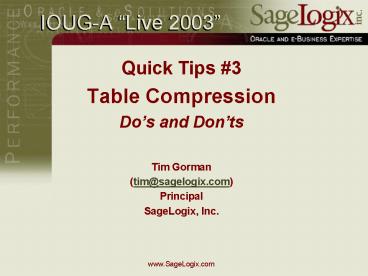Quick Tips - PowerPoint PPT Presentation
1 / 15
Title:
Quick Tips
Description:
Can be used for RANGE or LIST partitions. But cannot be used ... INSERT /* APPEND */ (single-threaded and parallel) ALTER TABLE ... MOVE ... ALTER TABLE ... – PowerPoint PPT presentation
Number of Views:33
Avg rating:3.0/5.0
Title: Quick Tips
1
IOUG-A Live 2003
- Quick Tips 3
- Table Compression
- Dos and Donts
- Tim Gorman
- (tim_at_sagelogix.com)
- Principal
- SageLogix, Inc.
2
Syntax
- Available in Oracle9i Release 2 (v9.2.0.x)
- Physical storage attribute for tables and
materialized views - CREATE ALTER TABLE
- COMPRESS NOCOMPRESS
- Can be used for RANGE or LIST partitions
- But cannot be used with HASH partitions
- But cannot be used for HASH or LIST
sub-partitions - Can be specified for NESTED tables
- But cannot be used with any LOB construct
- Such as CLOB, BLOB, BFILE, and VARRAY
- Not valid for index-organized or external tables
3
Syntax
- Can be set as a DEFAULT attribute on tablespaces
- Affects both tables and indexes in the tablespace
- Unless otherwise specified
- CREATE ALTER TABLESPACE
- DEFAULT COMPRESS NOCOMPRESS STORAGE
4
How does it work?
- Storing repeated data values once in each block
- A symbol table of data values created in each
block - The symbol table is stored as another table in
the block - Each column in a row in a block references back
to an entry in the symbol table in the block
Header Tailer
ITL
Table Column Map
Free
Symbol table
Row data
5
How does it work?
- All actual data values are stored in the blocks
symbol table - Each column within each row references the entry
in the symbol table with the data value - Data-value distribution is crucial!
- Many distinct and non-repeating data values do
not achieve good compression - Repeating data values achieve excellent
compression - Know thine data
6
Impact on DML
- Bulk-loading INSERT operations perform
compression - CREATE TABLE AS SELECT
- INSERT / APPEND / (single-threaded and
parallel) - ALTER TABLE MOVE
- ALTER TABLE MOVE PARTITION
- ALTER TABLE MERGE PARTITION
- ALTER TABLE SPLIT PARTITION
- SQLLoader DIRECTTRUE
- Conventional INSERT operations unaffected
- SELECT, UPDATE, and DELETE behavior also
unaffected
7
Impact on DML
- SELECT
- No performance differences observed
- Testing using repeating and non-repeating data
- Theoretically, some performance improvement
should be expected due to performing less I/O - FULL table scans should benefit more
- Indexed scans should not benefit at all
- probable performance decrease
- INSERT
- Up to 6-8x performance degradation observed
- During testing with repeating data
- Only 2-3x performance degradation observed with
non-repeating data - Theoretically, some performance improvement
should be expected due to performing less I/O
8
Impact on DML
- UPDATE
- Up to 6-8x negative performance impact observed
- Only when updating repeating data values
- Zero performance impact observed updating
non-repeating data values - Timings and logical-reads consistent with
NOCOMPRESS scenarios - DELETE
- About 2x negative performance impact observed
- Only when deleting repeating data values
- Zero performance impact observed deleting
non-repeating data values - Timings and logical-reads consistent with
NOCOMPRESS scenarios
9
Usage Scenarios
- Altering a table to compress newly inserted
blocks - SQLgt alter table sales compress
- Table altered.
- So what would happen here?
- Would data in all existing blocks be compressed?
- Would data in previously-unused blocks be
compressed, from now on? - Are there any other implications?
- Indexes?
- Dependent compiled objects?
10
Usage Scenarios
- Moving a table to compress all rows
- SQLgt alter table sales move compress
- Table altered.
- So what would happen here?
- Would data in all existing blocks be compressed?
- Would data in previously-unused blocks be
compressed, from now on? - Are there any other implications?
- Indexes?
- Dependent compiled objects?
- Dont forget DBMS_REDEFINITION as an alternative
11
Usage Scenarios
- Compressing and moving partitions before setting
a tablespace to READ ONLY - SQLgt alter table sales
- 2 move partition p199801
- 3 tablespace ro_p1998q1
- 4 compress nologging parallel
- Table altered.
- SQLgt alter tablespace ro_p1998q1 read only
- Tablespace altered.
12
Usage Scenarios
- Compressing and merging partitions before setting
a tablespace to READ ONLY - SQLgt alter table sales
- 2 merge partition p199801, p199802, p199803
- 3 into partition p1998q1
- 4 tablespace ro_p1998q1
- 5 compress nologging parallel
- Table altered.
- SQLgt alter tablespace ro_p1998q1 read only
- Tablespace altered.
13
Warnings
- Local partitioned indexes are marked UNUSABLE
during compression - Includes indexes on non-partitioned tables
- Must be rebuilt
- Global partitioned indexes can be maintained
using UPDATE GLOBAL INDEXES - Includes non-partitioned indexes on partitioned
tables - A rare situation when GLOBAL indexes can be more
highly available than LOCAL indexes!
14
Summary
- Summary
- For read-mostly objects, compression can have
space consumption benefits - Glitches
- None documented in MetaLink as of April 2003
- Documentation
- None documented in MetaLink as of April 2003
- OTN has a very good, detailed white paper on
table compression
15
QA
Quick Tips 3 Slides downloadable
from http//www.EvDBT.com/papers.htm And
http//www.SageLogix.com Tim Gorman































